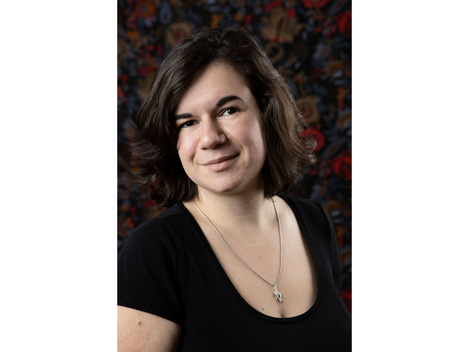 Photo © Erika Kapin
Photo © Erika Kapin
Isabel Frey is a PhD candidate in the structured doctoral program “Music matters” and a Yiddish singer and cultural activist. She studied social sciences at Amsterdam University College and Medical Anthropology & Sociology at the University of Amsterdam. Her masters’ thesis was a material-semiotic ethnography of recognition in a clinic for Chronic Fatigue Syndrome (CFS/ME). She has published peer-reviewed articles on eating disorders and on end-of-life decision-making after severe stroke after working as a Junior Researcher at the Amsterdam University Medical Centre. After returning to her hometown of Vienna, she started performing Yiddish revolutionary songs both in concert and at political protests, continuing the tradition of Jewish social justice activism. She regularly writes essays on issues of Jewish identity and Yiddish music. In her research project, she combines her passion for Yiddish music with her background in new-materialist and material-semiotic theory and methodology.
+43 1 71155 - 2046
Voices of Yiddishland: Diasporic afterlives of Yiddish folksongs
This research project studies the contemporary afterlives of Yiddish folksongs in the transnational Yiddish music scene with singers from Europe and North America. It is situated between the fields of ethnomusicology, cultural sociology and Jewish/Yiddish studies. It examines the practices of transmission of vernacular Yiddish singing and its particular performance style in a “postvernacular” age, and reads these complex cultural phenomena through the lens of Jewish diasporist and critical theory. Special attention is paid to the voice as a socio-material practice, its aesthetics and its enactment through techniques of listening, embodiment, affect and mimesis, as well as its temporal, spatial and gendered dimensions. The research methods are ethnographic interviews with professional and non-professional Yiddish singing teachers and students of Yiddish song, participant observation of Yiddish song classes and workshops and the documentation and analysis of Yiddish musical performances and productions. How is traditional Yiddish singing taught and learnt? What old and new aesthetics emerge from these practices? And what can we understand about Jewish belonging through a close-reading of these aesthetics? A central aim of this research project it to explore the politics of Yiddish folksong, and articulate a politics of the Yiddish voice that moves beyond culturally essentialist, ethno-nationalist and territorialist conceptions of Jewishness to the multiplicity, fluidity and complexity of diasporic belonging and the possibilities for transcultural solidarities.